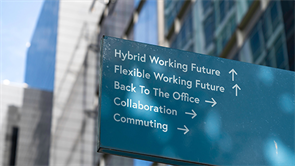
23 January 2024 | The Bureau
Hybrid Office
The term ‘hybrid office’ was, until the pandemic came along unheard of, but now it is talked about wherever you go. The hybrid office model is a flexible model allowing employees to work wherever they want, whether in their offices, at home or completely remotely. Most firms have now come to realise that work can be done anywhere, and with the right security credentials in place, safely and without the risk of hacks, phishing, and ransomware attacks.
The term ‘hybrid office’ was, until the pandemic came along unheard of, but now it is talked about wherever you go. The hybrid office model is a flexible model allowing employees to work wherever they want, whether in their offices, at home or completely remotely.Most firms have now come to realise that work can be done anywhere, and with the right security credentials in place, safely and without the risk of hacks, phishing, and ransomware attacks. Some employees during the pandemic were delighted to be working from home, whilst others preferred to be engaging with work colleagues in the office.
The vibe around office has always been a thing, but now that the hybrid office has become more the norm, firms are having to rethink their plans for employees and the office environments they work in. The ‘home office’ is now firmly established, with some who only work from home, whilst others opt for more days in the office, although for some, Fridays are now increasingly ‘work from home’ days.
Working in an office environment has been under scrutiny for the past 3 years with firms having to seriously look at what to do with their employees and whether to keep them at home or, as most seem to be doing, maintain a combination of the two. Hybrid office regimes are popping up everywhere with firms having to seriously think about how to manage their office space and whether do move or downsize in an attempt to control costs. The once full office now has far fewer employees sitting at their desks.
Thursdays are the new Fridays where some go out for lunch with few of turning up for work on Fridays. Whilst still working at home, this leaves offices pretty much deserted at the end of the week. This is of course, not the case for all firms but the longer the hybrid model goes on, the easier it will be to become the norm.
New contracts of employment may need to be issued or updated to cater for this different style of working practice for both office and home workers. Having employees working from their homes has needed a big investment in PCs and security, an expense that pre pandemic would have seemed very unlikely. The post pandemic costs for beefing-up the weaker security systems at employee homes, is beginning to pay off with smarter equipment and the associated home security upgrades, helping to make for more secure links with the office servers.
Security as a whole has improved, with firms having installed higher grade and stronger security in the homes of their employees; most are seeing the results of their hard work. Firms are beginning to find their feet with home security regimes paying off and in better shape to withstand hacks, phishing and ransomware attacks on Cloud and in-house servers.
Productivity at the home office seems to be rising as well, with employees beginning to look at ways to save their firms costs and being more efficient whilst working at home. Since the pandemic, Cloud systems have become more firmly established as the primary digital communication tool. With stronger security at home and in the office, management and employees can afford to be a little more relaxed about connecting to their servers. Security is essential to protect client data, and firms are becoming quite adept at managing this to safeguard their firms’ reputation for prudence and integrity. Knowing that your provider is taking an interest in your data security is increasing counting for a lot, and encouraging greater loyalty from clients and suppliers alike, as well as encouraging new and extra business.
When an employee is in the office they can engage in a conversation and discuss what is happening next week with work colleagues; when they are at home this cannot happen. There will need be greater emphasis on setting goals and projects for delivery, today, tomorrow, or next week. Employees will require more direction from management and be encouraged to be more efficient and productive whilst in their homes. Since many employees may be in only half the week, the threat of a cyber-attack when at home is a concern. However, now that home office environments are more secure, remote workers can rest more assured that everything has be done to safeguard the firm’s priceless data. By using strong passwords, even encryption, management and employees can feel safer working from home and in the office.